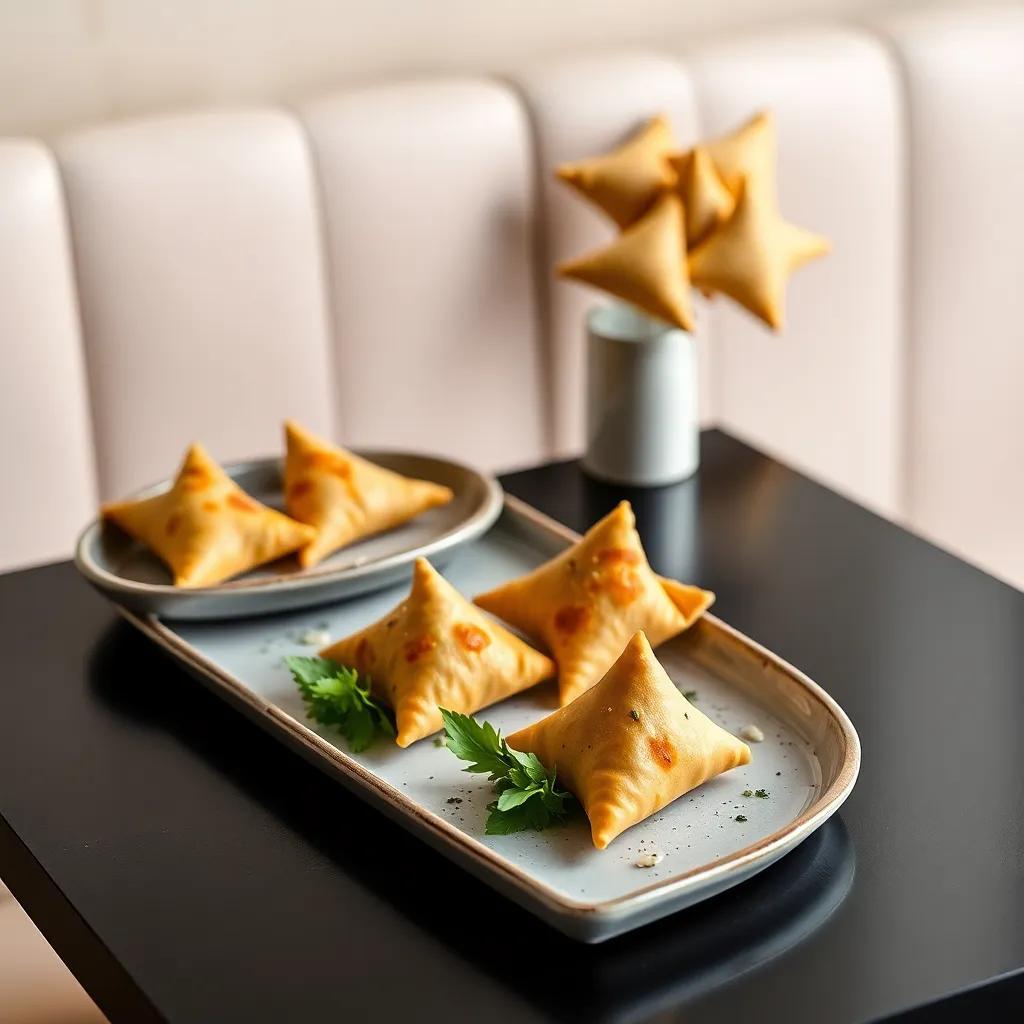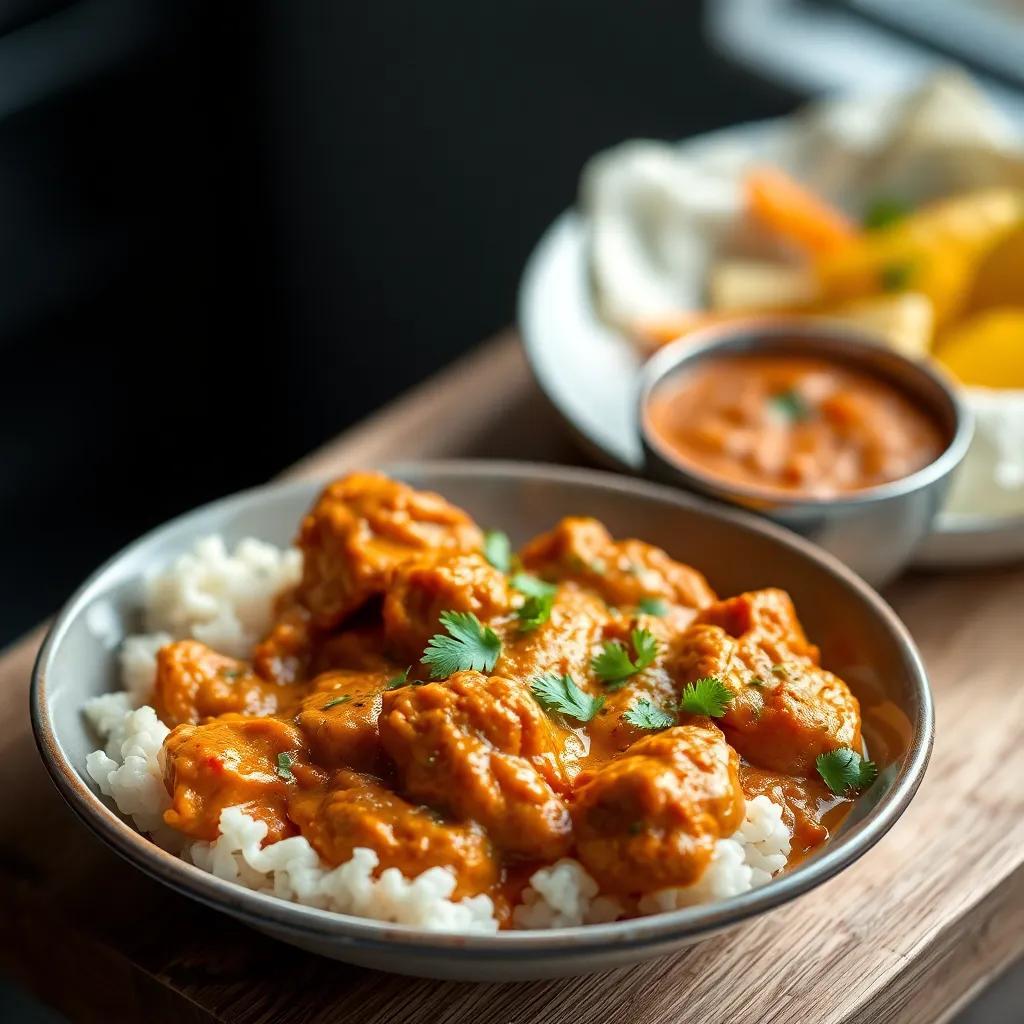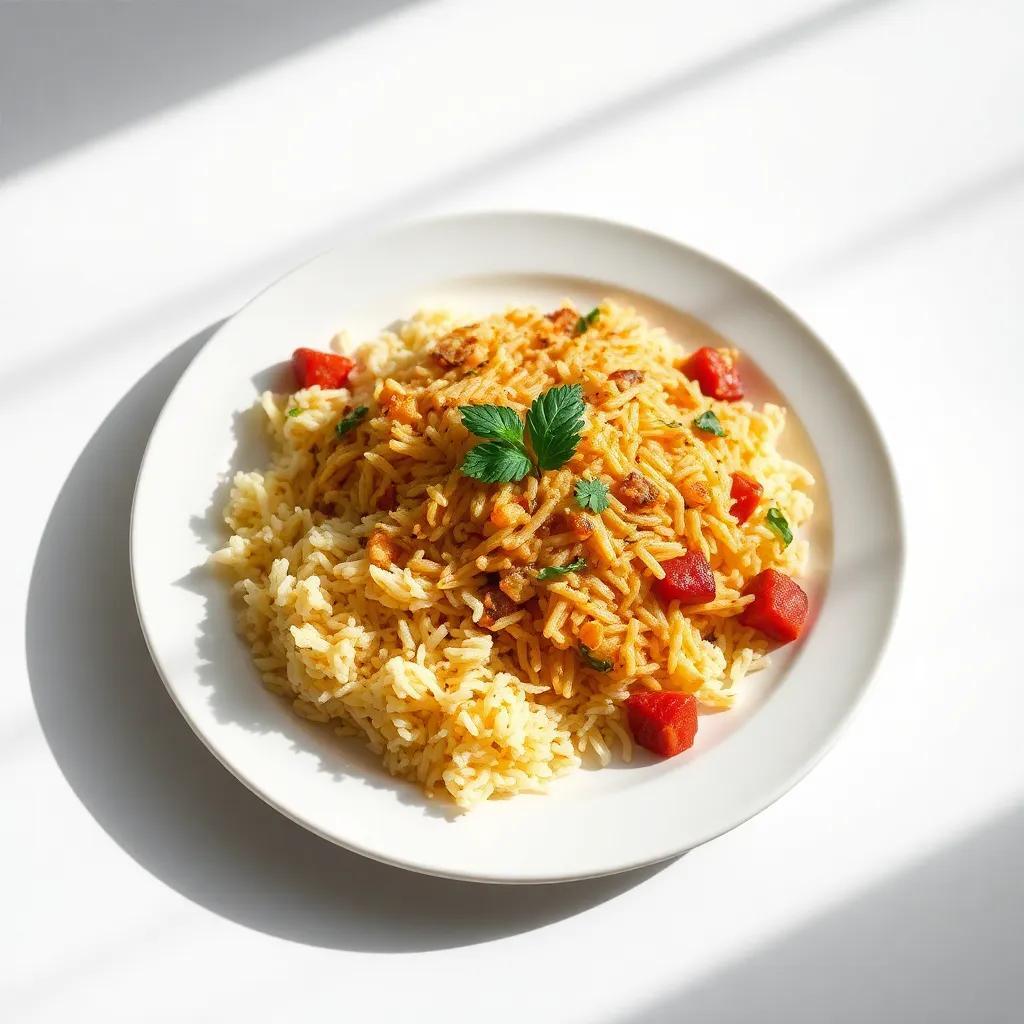Unlock Bold Flavors: Easy Authentic Tandoori Chicken Recipe
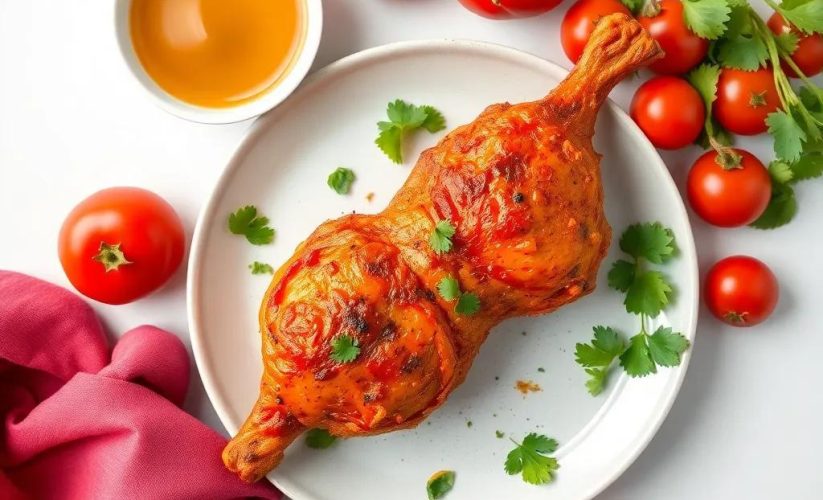
Unlock Bold Flavors: Easy Authentic Tandoori Chicken Recipe
🌍 Cuisine: Indian
⚙️ Difficulty: Medium
Ingredients
Nutrition Facts
350 kcal
Instructions
- In a large mixing bowl, combine yogurt, lemon juice, minced garlic, grated ginger, garam masala, cumin, turmeric, Kashmiri chili powder, ground coriander, ground cinnamon, salt, and vegetable oil. Mix well to form a smooth marinade.
- Make several deep slashes in each chicken leg quarter to allow the marinade to penetrate deeply.
- Add the chicken pieces to the marinade and coat thoroughly. Cover the bowl with plastic wrap and refrigerate for at least 4 hours, preferably overnight for best flavor.
- Preheat your grill or oven to 425°F (220°C). If using an oven, line a baking tray with foil and place a wire rack on top.
- Remove the chicken from the marinade, letting excess drip off, and place on the grill or wire rack.
- Grill or bake the chicken for about 35-40 minutes, turning occasionally to ensure even cooking and slight charring. Use a meat thermometer to ensure internal temperature reaches 165°F (74°C).
- Optional: For extra smoky flavor, you may add a small piece of hot charcoal to a bowl, heat it over a gas flame until red hot, then place it in the marinade bowl, cover tightly to trap the smoke for 10 minutes before cooking.
- Once cooked, remove chicken from heat and let it rest for 5 minutes.
- Garnish with freshly chopped cilantro and serve with lemon wedges.
Serving Suggestions
- Serve with warm naan bread or steamed basmati rice for a complete meal.
- Pair with a cooling cucumber raita or yogurt sauce to balance the spices.
- Accompany with a fresh salad of onions, tomatoes, and cucumbers tossed with lemon juice.
- Add some grilled vegetables like bell peppers or onions on the side.
- Garnish with extra fresh cilantro and a sprinkle of chat masala for enhanced flavor.
- Serve with a side of mango chutney or mint chutney for contrasting sweetness and freshness.
Table of Contents
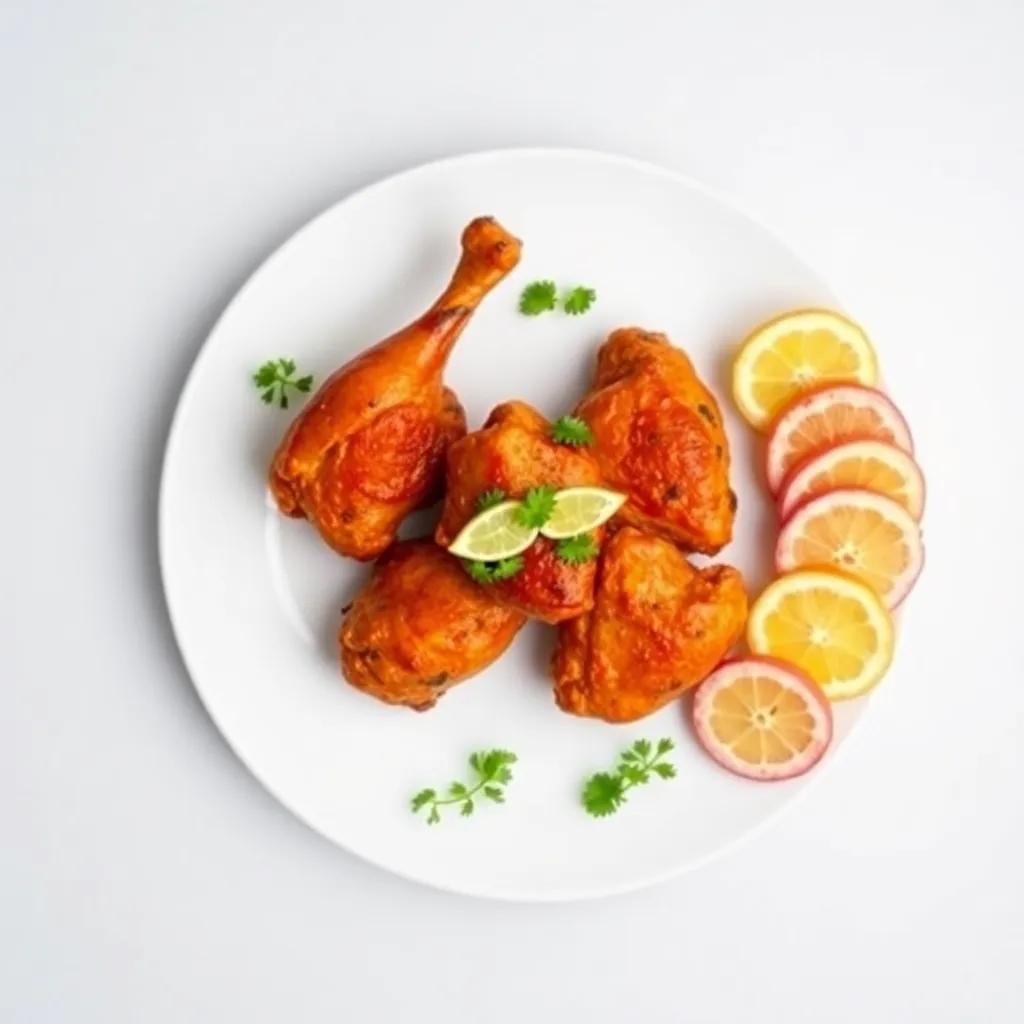
Intro
Step into the vibrant world of Indian cuisine with this easy, authentic Tandoori Chicken recipe that promises to awaken your taste buds with bold, smoky flavors. This dish is a beautiful balance of tangy, spicy, and aromatic elements that come together to create a meal both comforting and exciting. Whether you’re hosting a casual weekend barbecue, preparing a special family dinner, or looking to impress guests with something exotic yet approachable, this recipe delivers a crowd-pleasing experience without overwhelming complexity.
What makes this preparation truly inviting is its versatility and the fact that it doesn’t require a traditional tandoor oven—using your home grill or oven yields equally delicious results. The process encourages a bit of patience during marination, but the hands-on time is minimal, allowing both novice cooks and seasoned chefs to enjoy the rewarding journey from kitchen to table. Plus, its vibrant presentation with fresh cilantro and lemon wedges adds a pop of color and freshness, making every meal feel festive.
Perfect served alongside warm breads or fragrant rice, this Tandoori Chicken brings an element of celebration and comfort that can enhance any occasion, from weeknight dinners to festive gatherings. It’s more than just a recipe—it’s an invitation to explore, enjoy, and share bold flavors with loved ones.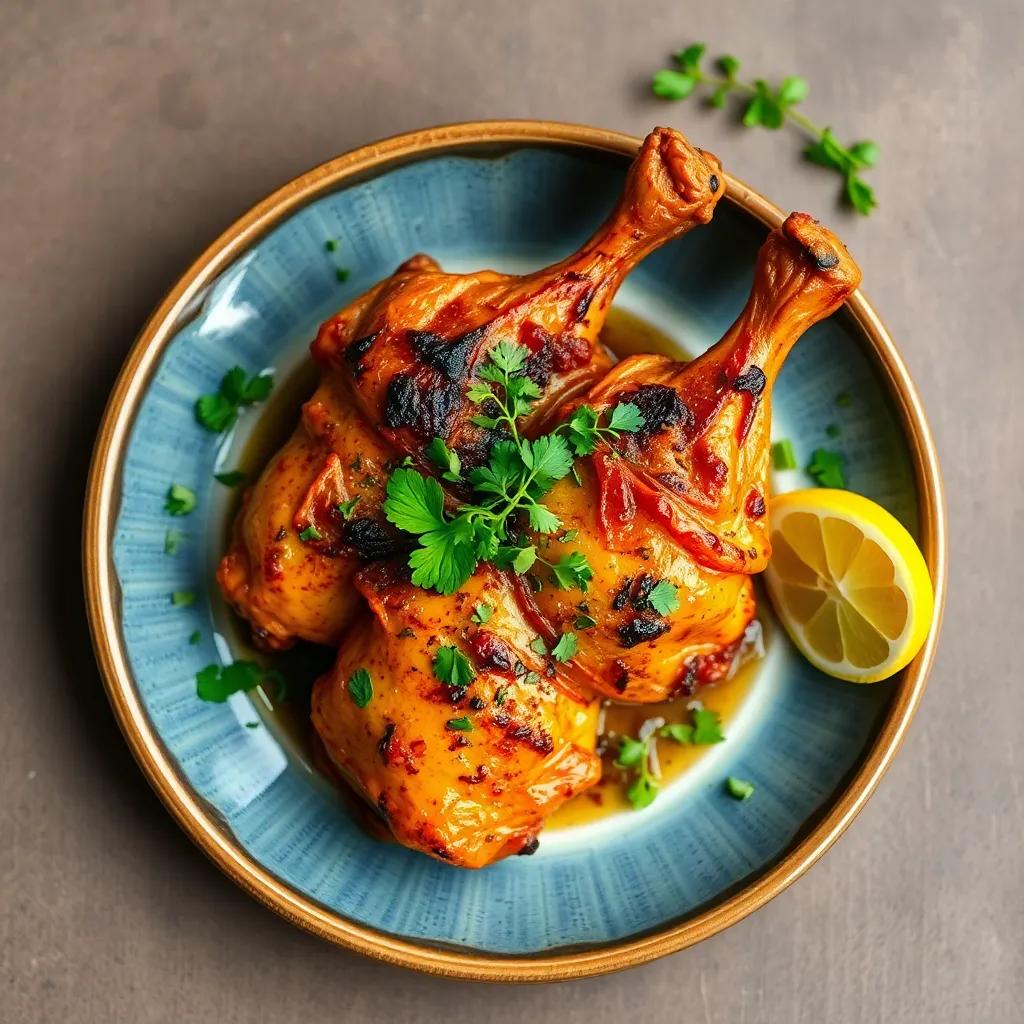
Ingredient Notes
In crafting an authentic tandoori chicken, certain ingredients play starring roles that elevate the dish from simple grilled chicken to an unforgettable flavor experience. Understanding these key components will help you achieve the true essence of this classic Indian favorite.
Kashmiri Red Chili Powder
This vibrant red spice is much more than just heat—it imparts a bright, deep color and a subtle fruity warmth that defines the signature look and flavor of tandoori chicken. Unlike regular red chili powder, Kashmiri chili is milder but rich in aroma, giving the chicken a beautiful crimson hue without overpowering spiciness. When shopping, look for pure Kashmiri chili powder in Indian or specialty spice stores; if unavailable, high-quality sweet paprika makes a suitable, milder substitute that still brings color, though with less heat.
Plain Yogurt (Preferably Greek)
Yogurt is the creamy canvas on which the marinade is built. Its slight tanginess tenderizes the chicken, breaking down muscle fibers to ensure juicy, succulent meat after cooking. Greek yogurt is preferred for its thick texture, which helps the marinade cling better to the chicken, locking in moisture and flavor. If you can’t find Greek yogurt, plain full-fat yogurt is a fine alternative—just strain it through a cheesecloth for 30 minutes to thicken it up.
Garam Masala
A warm and complex blend of spices, garam masala adds an aromatic depth essential to authentic Indian cooking. While individual recipes vary, this mixture typically includes cinnamon, cardamom, cloves, peppercorns, and cumin, delivering a subtle heat and sweetness that balances the tangy yogurt and smoky chili. If you prefer, you can make your own blend or buy a fresh, high-quality garam masala from an Indian grocer for the best flavor impact.
Mustard Oil (Optional but Authentic)
While vegetable oil provides a neutral base for the marinade, mustard oil introduces a fascinating pungency and sharpness that’s traditional in many North Indian tandoori preparations. It lends a slight bite that complements the smoky spices beautifully. If mustard oil is new to you, be sure to buy “food grade” and heat it briefly before use to mellow any raw harshness. If unavailable or a milder profile is preferred, stick to vegetable or canola oil without sacrificing tenderness.
By carefully selecting these ingredients and understanding their roles, you’ll unlock the bold, balanced flavors that make tandoori chicken a beloved dish worldwide—no tandoor needed. Experiment with sourcing fresh spices and quality yogurt, and you’ll notice the difference in every juicy, smoky bite.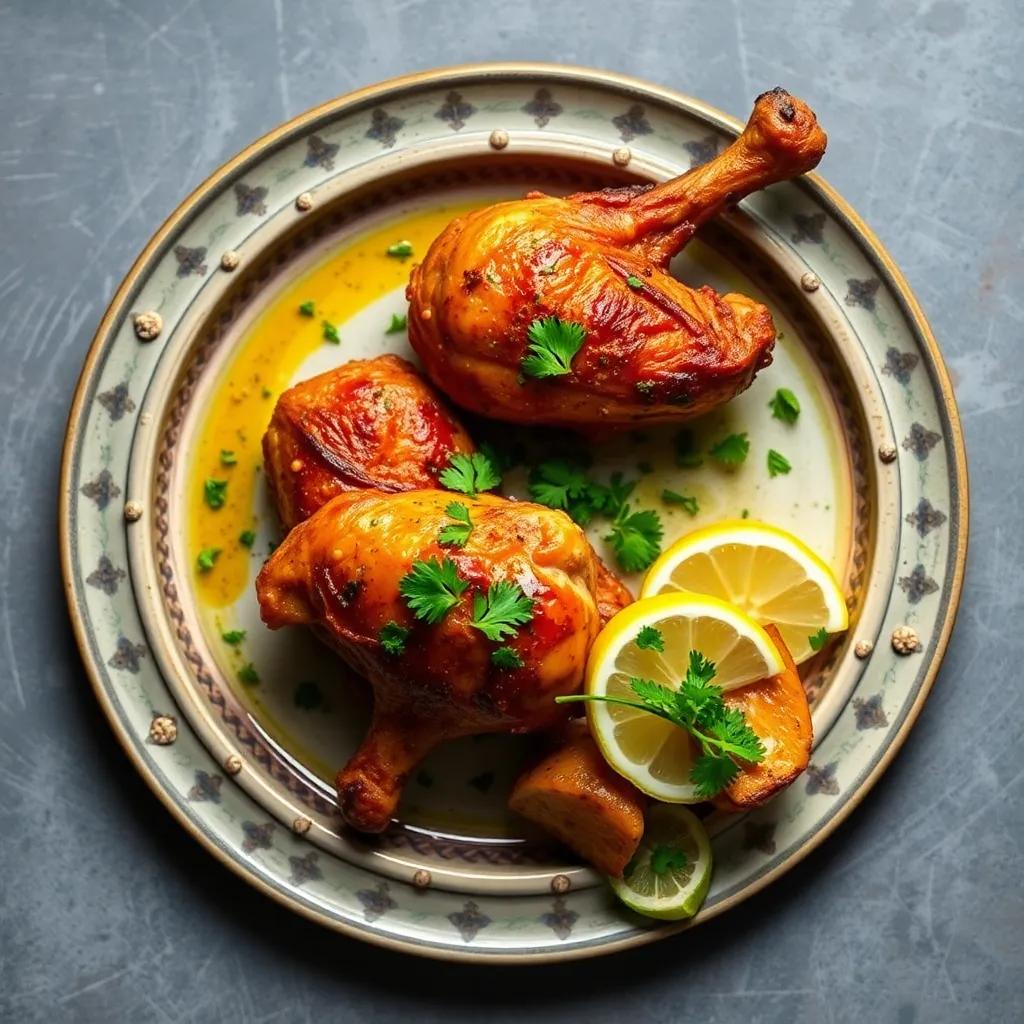
Tips & Variations
To elevate your Tandoori Chicken experience and tailor it perfectly to your taste and lifestyle, consider these expert tips and versatile variations:
- Marination Mastery: For maximum flavor penetration, marinate the chicken for at least 8 hours or overnight. If short on time, even 2-3 hours can work, but longer marination allows the yogurt and spices to deeply tenderize and infuse the meat with complexity.
- Choosing the Right Chicken Cuts: While this recipe calls for leg quarters, using bone-in, skinless thighs or drumsticks delivers equally juicy results. For a leaner option, breasts can be used but require careful monitoring to avoid drying out; consider reducing cooking time.
- Smoke Infusion Alternatives: If you don’t have access to a grill or traditional smoking methods, replicate the smoky aroma by adding a drop of liquid smoke to the marinade, or try incorporating smoked paprika alongside Kashmiri chili powder. Another subtle trick is to briefly grill sliced onions until charred and include their smoky flavor in the sauce or sides.
- Oven vs. Grill: The grill imparts authentic charred edges, but baking on a wire rack inside a hot oven ensures even cooking and less mess. For a crispier exterior, finish under the broiler for 2-3 minutes while watching closely to prevent burning. Using a convection oven setting can also boost caramelization and texture.
- Adjusting Spice Levels: Customize heat to your preference by tweaking the Kashmiri chili powder. Replace with mild paprika for a gentle warmth or add a pinch of cayenne for a fiery kick. Fresh green chili or chili flakes can also be incorporated in the marinade for those who crave extra spice.
- Mustard Oil Alternatives: If mustard oil’s pungency is too bold or hard to find, try grapeseed or avocado oil for a neutral flavor. For authentic aroma with less intensity, infuse vegetable oil with a few mustard seeds heated briefly, then cooled, before adding to the marinade.
- Gluten-Free and Allergy-Friendly: This recipe is naturally gluten-free as it contains no wheat or gluten ingredients. Just double-check that your garam masala and chili powders are pure spices without added fillers. For dairy-free adaptation, substitute the yogurt with a thick plant-based yogurt like coconut or cashew yogurt. Add a splash of lemon juice to help tenderize and maintain tang.
- Vegan Variation: To create a vegan “tandoori” version, swap chicken for hearty vegetables such as cauliflower florets, portobello mushrooms, or tofu. Marinate these in the same spice blend with plant-based yogurt, and grill or roast until charred and tender. This is a delicious way to enjoy the bold flavors of tandoori without animal products.
- Serving Suggestions with a Twist: Elevate your plating by topping the chicken with pickled onions or a drizzle of mint-cilantro chutney. For contrast, serve alongside cooling raita with cucumber and a sprinkle of roasted cumin powder. If you want extra richness, offer a side of spiced butter naan or garlic-infused basmati rice.
Embracing these tips and variations not only personalizes your Tandoori Chicken but encourages culinary creativity, making this classic Indian dish fit effortlessly into different palates and dietary needs. Whether you keep it traditional or experiment boldly, the key lies in balancing smoky heat, vibrant spices, and tender texture for that unforgettable meal.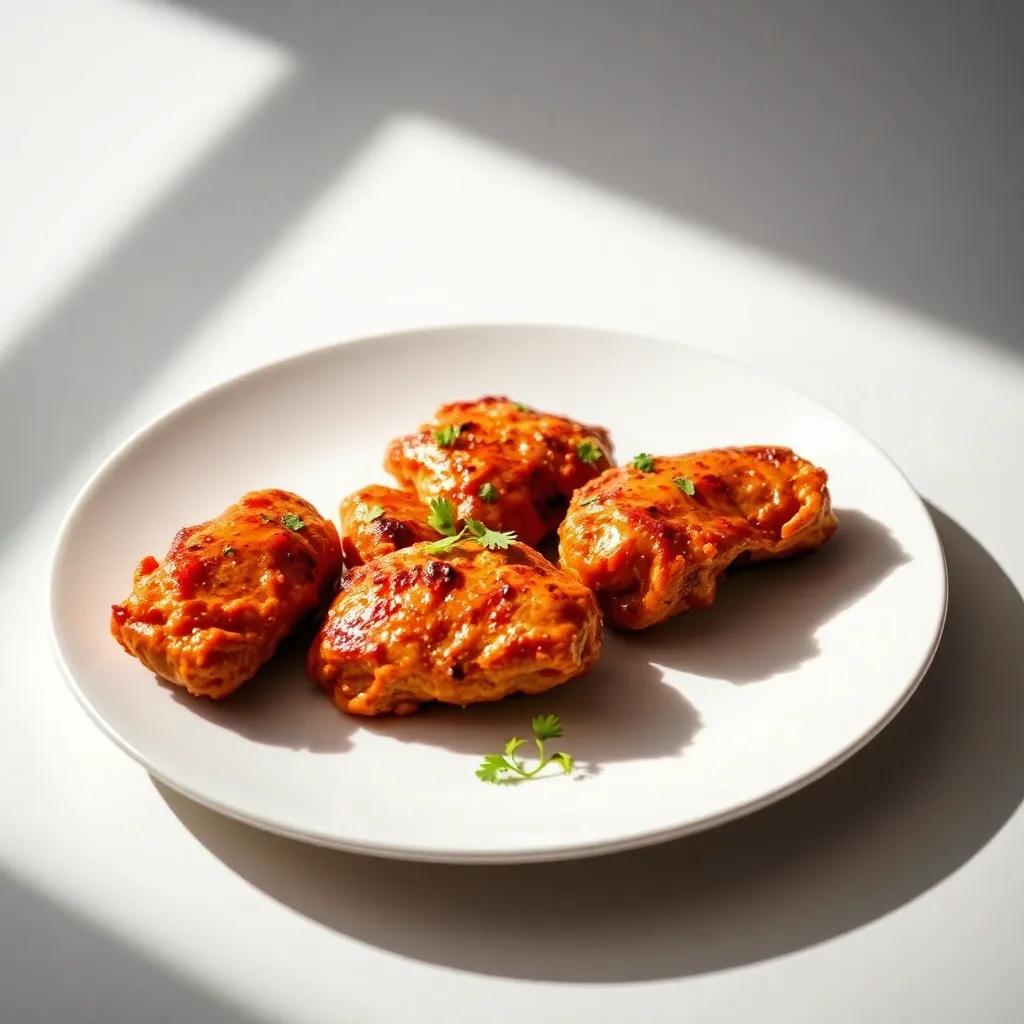
Leftovers & Storage
After savoring this vibrant and aromatic Tandoori Chicken, you might find yourself with some delicious leftovers—good news, because this dish keeps well and can even improve in flavor after a day as the spices continue to meld. To preserve the bold flavors and juicy texture, it’s important to store leftovers properly.
First, allow the chicken to cool to room temperature, but don’t leave it out for more than two hours to maintain food safety. Wrap each piece tightly in aluminum foil or plastic wrap, or ideally transfer the portions into airtight containers. Containers with tight-sealing lids or vacuum-sealed bags work best to lock in moisture and prevent any lingering odors from spreading in the fridge.
Once stored in the refrigerator, the chicken will remain fresh for up to 3-4 days. To reheat, use an oven or air fryer at a moderate temperature (about 325°F or 160°C) instead of the microwave, which can dry out the meat. Wrapping the chicken loosely with foil during reheating helps retain juiciness, while a quick broil at the end can revive that signature slightly charred exterior.
If you want to save your tandoori chicken for longer, freezing is a great option. Place cooled pieces in a freezer-safe container or bag, removing as much air as possible to avoid freezer burn. Frozen, the chicken maintains its quality for up to 2 months. Thaw overnight in the refrigerator before reheating gently as described above.
For meal prep enthusiasts, Tandoori Chicken offers an easy, flavorful protein you can prepare ahead and incorporate into various meals throughout the week. Slice the chicken to top salads, stuff wraps, or serve alongside steamed rice and vegetables warmed at serving time. The marinade’s spices hold up well, adding depth even after storage.
In summary, proper cooling, airtight storage, and gentle reheating will help keep your leftovers tasting just as vibrant as when freshly made—so you can enjoy that bold, smoky magic again with ease.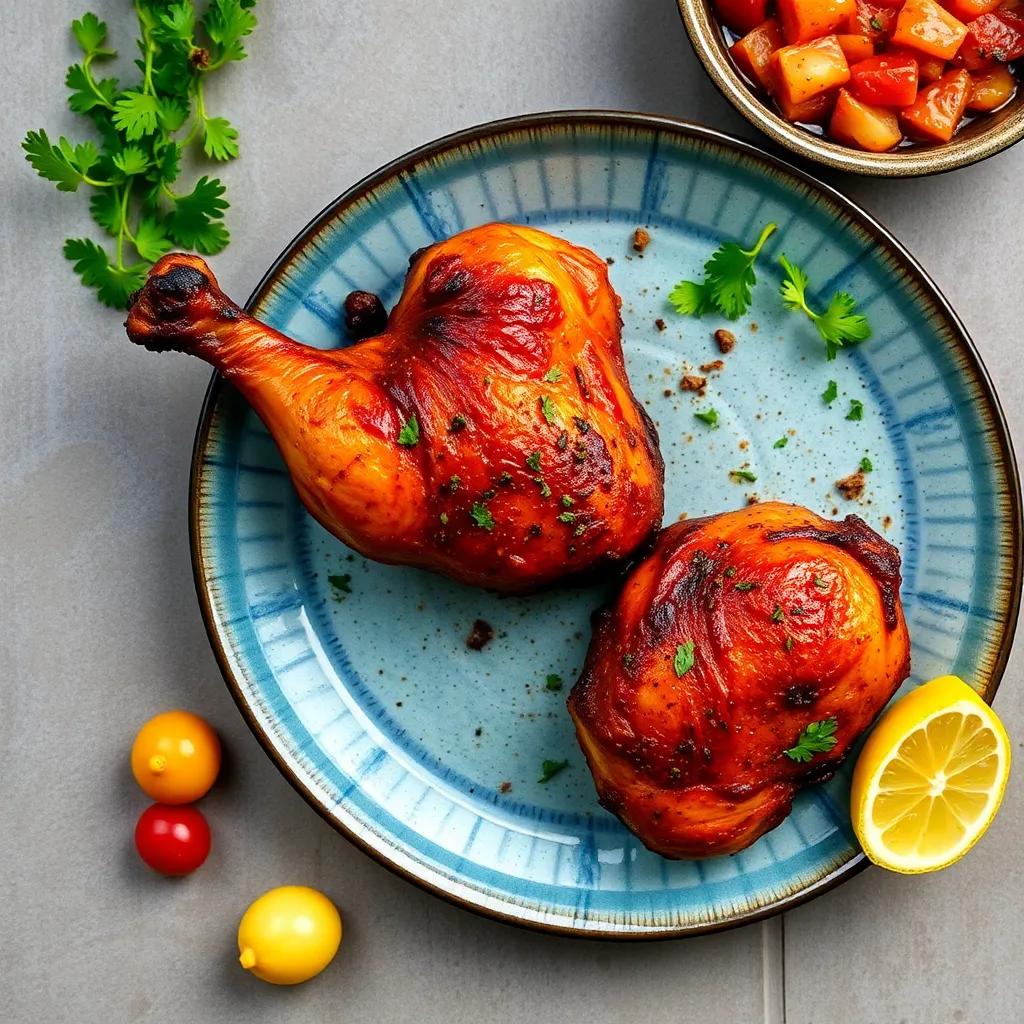
Behind the Recipe
Tandoori Chicken is more than just a flavorful dish; it carries with it a rich tapestry of history and culture that stretches back centuries in the Indian subcontinent. Originating from the Punjab region, this iconic recipe was traditionally prepared in a tandoor—an earthen clay oven heated by charcoal or wood fire—which imparts its distinctive smoky aroma and charred texture. The technique and spices used tell the story of India’s diverse culinary heritage, blending Mughal influences with regional spice traditions.
For many, tandoori chicken embodies celebration and communal dining. It was often made during festivals, weddings, and special gatherings, where the sizzling aroma would gather family and friends around the table. The vibrant red hue—originally enhanced by natural spices like Kashmiri chili and sometimes even by the use of beetroot juice in modern adaptations—is visually striking and signals warmth and hospitality.
On a personal note, this recipe is a homage to those timeless family kitchens where slow marination and patience transformed humble ingredients into an unforgettable feast. The joy lies not just in the end result but in the ritual: mixing fresh ginger and garlic, watching the yogurt and spices meld into a luscious marinade, and the anticipation as the chicken absorbs every layer of flavor. Even without a traditional tandoor, recreating that experience at home connects us to the essence of a cuisine steeped in history and love.
Using everyday kitchen tools to replicate these bold, smoky flavors makes this dish accessible to cooks worldwide, inviting everyone to partake in a culinary tradition that celebrates richness, warmth, and the joy of shared meals. Each bite thus becomes a small journey—a taste of ancient kitchens, vibrant markets, and joyous feasts passed down through generations.
FAQ
Can I use chicken parts other than thighs for this recipe?
How can I make this recipe dairy-free?
Can I marinate the chicken ahead of time? How long is too long?
What’s the best way to reheat leftover tandoori chicken?
Is it possible to make this recipe vegetarian or vegan?
How do I freeze tandoori chicken for later use?
Can I adjust the spice level to suit my taste?
Wrapping It Up
There’s something truly special about the vibrant spices and smoky aroma of tandoori chicken that brings a burst of bold flavor to any meal. This easy, authentic recipe lets you experience that magic right in your own kitchen—no tandoor required! Whether you’re cooking for family or friends, it’s a sure way to impress and satisfy with every tender, flavorful bite.
We’d love to hear how your tandoori adventure turns out! Share your thoughts, rate the recipe, or tell us about your own creative twists in the comments below. Happy cooking, and here’s to unlocking bold flavors that bring everyone to the table!










